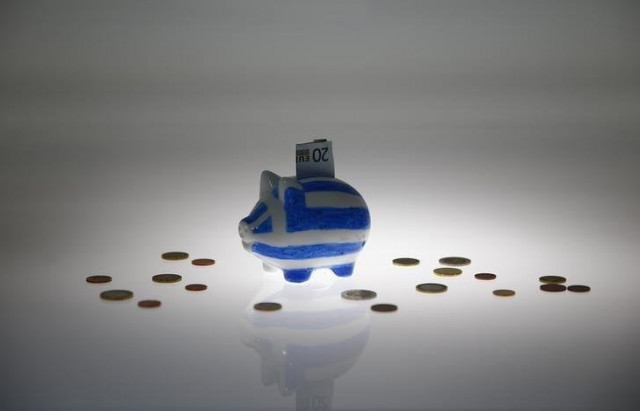Greece needs 'far less' money than agreed in third bailout: ESM head
The review of the Greek bailout program has been beset by delays and disputes between Athens and its EU creditors

A piggybank painted in the colours of the Greek flag with a 20 euro banknote in it's slot, stands amongst various euro coins in this picture illustration taken in Berlin, Germany June 30, 2015. PHOTO: REUTERS
Klaus Regling told German newspaper Bild that at the end of Greece's money-for-reforms package in August 2018, the European Stability Mechanism (ESM) will "probably have paid out far less than the agreed maximum amount of 86 billion euros" because the Greek budget was developing better than expected.
Pakistan predicted to be world’s fastest-growing Muslim economy in 2017
The comments came shortly before euro zone finance ministers will meet in Brussels to assess Greece's progress in fulfilling the conditions of its bailout.
Bavarian Finance Minister Markus Soeder called for a tougher stance in negotiations with Greece, suggesting Athens should only get fresh aid from its lenders against additional collateral such as cash, gold or real estate.
"We need a plan B," Soeder told Bild newspaper.
The review of the Greek bailout program has been beset by delays and disputes between Athens and its European Union and International Monetary Fund creditors. As disagreement has arisen over Greece's fiscal targets, debt relief and promised reforms, fears have grown that Europe could face a new financial crisis.
Greece has said it cannot cut pensions any further as demanded by the International Monetary Fund while some of its European lenders, led by Germany, have rejected the IMF's demand to grant it debt relief of some sort - perhaps on payments and maturity - now.
The Fund has insisted on debt relief and precautionary fiscal measures to ensure that Athens can meet its fiscal targets before it will consider participating in the bailout.
The German government, gearing up for election in September, opposes debt relief for Greece as demanded by the IMF, and says the current program can only continue if the Fund joins in.
The IMF's participation remains unclear and this question is likely to be one of the main talking points when German Chancellor Angela Merkel and IMF Managing Director Christine Lagarde meet on Wednesday.
Post-Eurozone Crisis: Greece to lift capital controls soon
The IMF declined to comment on a German magazine report on Friday that it was likely to contribute up to 5 billion euros ($5.3 billion) to a third bailout package for Greece, saying its views on the deal had not shifted.
The German magazine Der Spiegel said in an unsourced report that European lenders were now expecting the IMF to contribute a sum of this size after first having hoped for 16 billion euros.


















COMMENTS
Comments are moderated and generally will be posted if they are on-topic and not abusive.
For more information, please see our Comments FAQ